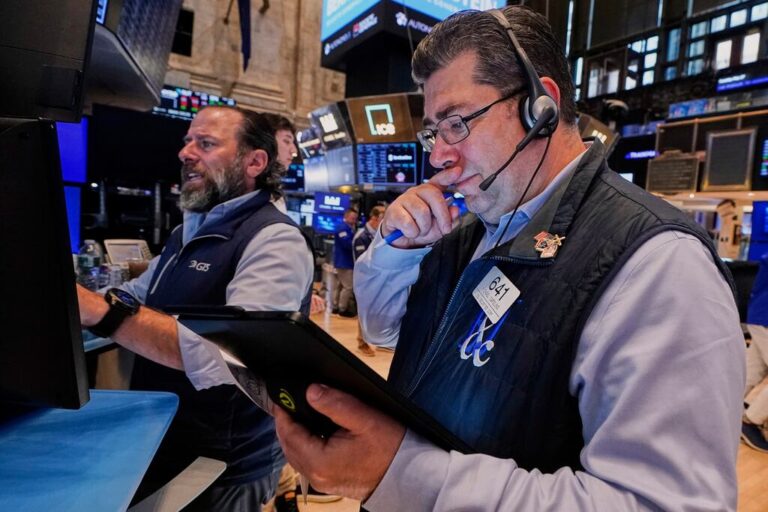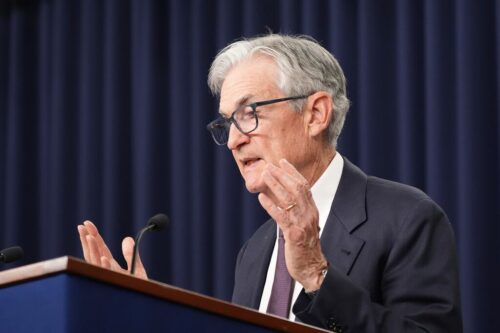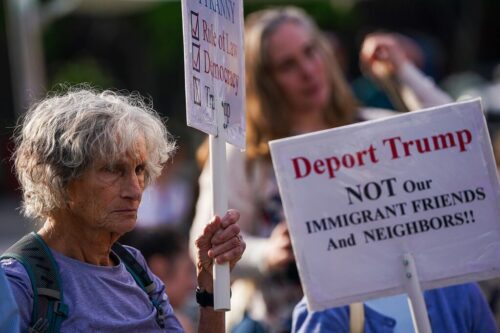Financial markets welcomed a US court ruling that blocks President Donald Trump from imposing sweeping tariffs on imports under an emergency-powers law.
US futures jumped early Thursday and oil prices rose more than $1. The US dollar rose against the yen and euro.
The court found the 1977 International Emergency Economic Powers Act, which Trump has cited as his basis for ordering massive increases in import duties, does not authorize the use of tariffs.
The White House immediately appealed and it was unclear if Trump would abide by the ruling in the interim. The long term outcome of legal disputes over tariffs remains uncertain. But investors appeared to take heart after the months of turmoil brought on by Trump’s trade war.
The future for the S&P 500 was up 1.5 percent while that for the Dow Jones Industrial Average gained 1.2 percent.
In early European trading, Germany’s DAX gained 0.5 percent to 24,160.75. The CAC 40 in Paris jumped 0.9 percent to 7,860.67. Britain’s FTSE was nearly unchanged at 8,722.63.
Japan’s Nikkei 225 index jumped 1.9 percent to 38,432.98. American’s largest ally in Asia has been appealing to Trump to cancel the tariffs he has ordered on imports from Japan and to also stop 25 percent tariffs on steel, aluminum and autos.
The ruling also pushed the dollar sharply higher against the Japanese yen. It was trading at 145.40 yen early Thursday, up from 144.87 yen late Wednesday.
A three-judge panel ruled on several lawsuits arguing Trump exceeded his authority, casting doubt on trade policies that have jolted global financial markets, frustrated trade partners and raised uncertainty over the outlook for inflation and the global economy.
Many of Trump’s double-digit tariff hikes are paused for up to 90 days to allow time for trade negotiations, but the uncertainty they cast over global commerce has stymied businesses and left consumers wary about what lies ahead.
“Just when traders thought they’d seen every twist in the tariff saga, the gavel dropped like a lightning bolt over the Pacific,” Stephen Innes of SPI Asset Management said in a commentary.
The ruling was, at the least, “a brief respite before the next thunderclap,” he said.
Elsewhere in Asia, Hong Kong’s Hang Seng added 1.3 percent to 23,561.86, while the Shanghai Composite index gained 0.7 percent to 3,363.45.
Australia’s S&P/ASX 200 gained 0.2 percent to 8,409.80.
In South Korea, which like Japan relies heavily on exports to the US, the Kospi surged 1.9 percent to 2,720.64. Shares also were helped by the Bank of Korea’s decision to cut its key interest rate to 2.5 percent from 2.75 percent, to ease pressure on the economy.
Taiwan’s Taiex edged 0.1 percent lower, and India’s Sensex lost 0.2 percent.
On Wednesday, US stocks cooled, with the S&P 500 down 0.6 percent but still within 4.2 percent of its record after charging higher amid hopes that the worst of the turmoil caused by Trump’s trade war may have passed. It had been roughly 20 percent below the mark last month.
The Dow industrials lost 0.6 percent and the Nasdaq composite fell 0.5 percent.
Trading was relatively quiet ahead of a quarterly earnings release for Nvidia, which came after markets closed.
The bellwether for artificial intelligence overcame a wave of tariff-driven turbulence to deliver another quarter of robust growth thanks to feverish demand for its high-powered chips that are making computers seem more human. Nvidia’s shares jumped 6.6 percent in afterhours trading.
Like Nvidia, Macy’s stock also swung up and down through much of the day, even though it reported milder drops in revenue and profit for the latest quarter than analysts expected. Its stock ended the day down 0.3 percent.
The bond market showed relatively little reaction after the Federal Reserve released the minutes from its latest meeting earlier this month, when it left its benchmark lending rate alone for the third straight time. The central bank has been holding off on cuts to interest rates, which would give the economy a boost, amid worries about inflation staying higher than hoped because of Trump’s sweeping tariffs.
In other dealings early Thursday, the yield on the 10-year Treasury rose to 4.52 percent from 4.47 percent late Wednesday.
US benchmark crude oil gained $1.06 to $62.90 per barrel. Brent crude, the international standard, added $1.00 to $65.32 per barrel.
The euro slipped to $1.1280 from $1.1292.
What happens to Trump’s tariffs now that a court has ruled against them? Federal court blocks Trump from imposing sweeping tariffs under emergency powers lawTrump bristles at ‘TACO Trade’ that bets on him backing down




Comment count: